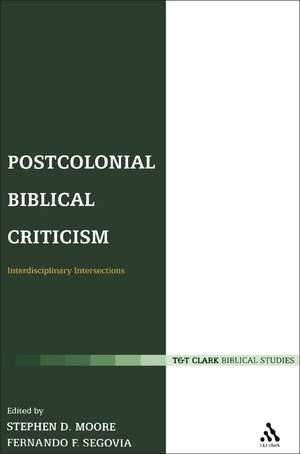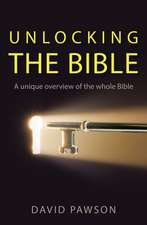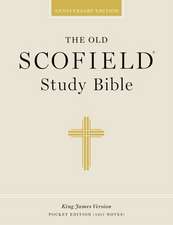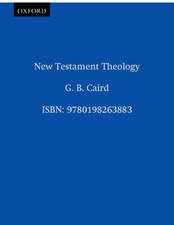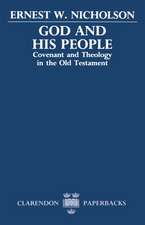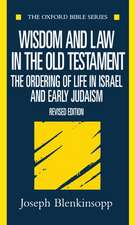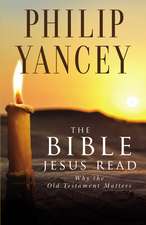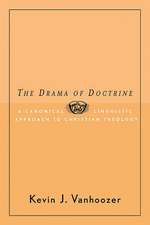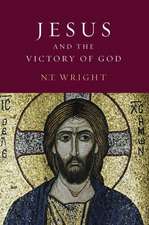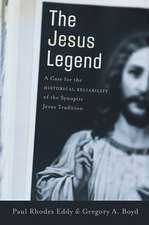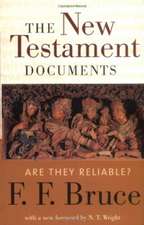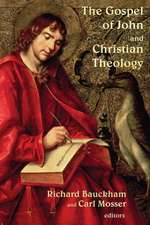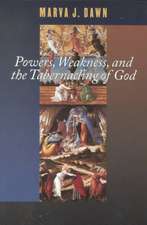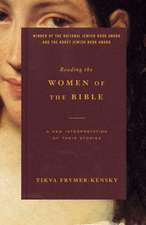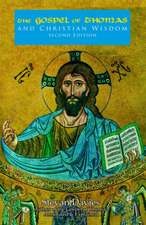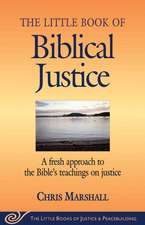Postcolonial Biblical Criticism: Interdisciplinary Intersections: Bible and Postcolonialism
Autor Fernando F. Segovia, Professor Stephen D. Mooreen Limba Engleză Paperback – 13 dec 2006
| Toate formatele și edițiile | Preț | Express |
|---|---|---|
| Paperback (1) | 263.36 lei 6-8 săpt. | |
| Bloomsbury Publishing – 13 dec 2006 | 263.36 lei 6-8 săpt. | |
| Hardback (1) | 772.81 lei 6-8 săpt. | |
| Bloomsbury Publishing – 5 apr 2005 | 772.81 lei 6-8 săpt. |
Preț: 263.36 lei
Preț vechi: 324.05 lei
-19% Nou
Puncte Express: 395
Preț estimativ în valută:
50.40€ • 52.42$ • 41.61£
50.40€ • 52.42$ • 41.61£
Carte tipărită la comandă
Livrare economică 15-29 aprilie
Preluare comenzi: 021 569.72.76
Specificații
ISBN-13: 9780567045300
ISBN-10: 0567045307
Pagini: 216
Dimensiuni: 156 x 234 x 17 mm
Greutate: 0.33 kg
Ediția:Revised
Editura: Bloomsbury Publishing
Colecția T&T Clark
Seria Bible and Postcolonialism
Locul publicării:London, United Kingdom
ISBN-10: 0567045307
Pagini: 216
Dimensiuni: 156 x 234 x 17 mm
Greutate: 0.33 kg
Ediția:Revised
Editura: Bloomsbury Publishing
Colecția T&T Clark
Seria Bible and Postcolonialism
Locul publicării:London, United Kingdom
Caracteristici
The most in-depth introduction to Postcolonial biblical studies to date. Contributors are all seasoned scholars and well-known figures in contemporary biblical studies. Postcolonial theory offers great promise for opening up a whole new way of interpreting the Bible and interrogating colonial assumptions embedded in biblical interpretation. The Bible and Postcolonialism series examines this, one of the most challenging and contentious critical categories that have emerged in our time.
Cuprins
Stephen D. Moore, Theological School, Drew University, USA and Fernando F. Segovia, Divinity School, Vanderbilt University, USA
'Postcolonial Biblical Criticism: Meanderings and Intersections'
'Postcolonial Biblical Criticism: Meanderings and Intersections'
Fernando F. Segovia, Divinity School, Vanderbilt University, USA
'Mapping the Postcolonial Optic for Biblical Criticism: Meaning and Scope'
'Mapping the Postcolonial Optic for Biblical Criticism: Meaning and Scope'
Stephen D. Moore, Theological School, Drew University, USA
'Questions of Biblical Ambivalence and Authority under a Tree outside Delhi; or, the Postcolonial and the Postmodern'
'Questions of Biblical Ambivalence and Authority under a Tree outside Delhi; or, the Postcolonial and the Postmodern'
Laura E. Donaldson, Cornell University, USA
'Gospel Hauntings: The Postcolonial Demons of New Testament Criticism'
'Gospel Hauntings: The Postcolonial Demons of New Testament Criticism'
Tat-siong Benny Liew, Chicago Theological Seminary, USA
'Margins and (Cutting-)Edges: On the (Il)Legitimacy and Intersections of Race, Ethnicity, and (Post)Colonialism'
'Margins and (Cutting-)Edges: On the (Il)Legitimacy and Intersections of Race, Ethnicity, and (Post)Colonialism'
Roland Boer, Monash University
'Marx, Postcolonialism, and the Bible'
'Marx, Postcolonialism, and the Bible'
David Jobling, University of Saskatchewan, Canada
'Very Limited Ideological Options'
'Very Limited Ideological Options'
Recenzii
The assemblage of biblical scholars who have contributed to this book is its major strength. These are all well-published authors, most of whom have spent decades traversing the theoretical underpinnings of various critical approaches to the Bible - poststructuralism, postmodernism, Marxism, ideological criticism, feminism, and race/ethnicity.before turning to postcolonialism. .. for many biblical scholars, most of whom may be just beginning to reflect on concepts such as hybridity, mimicry, ambivalence, dislocation, diaspora, colonialism, and the like, this book should find a ready reading audience. The authors have a firm grasp of the issues at stake in interpreting the Bible along postcolonial lines. The book deserves to be read widely and would be especially useful in upper-division undergraduate classes in Bible and in seminary courses dealing with hermeneutical issues.
